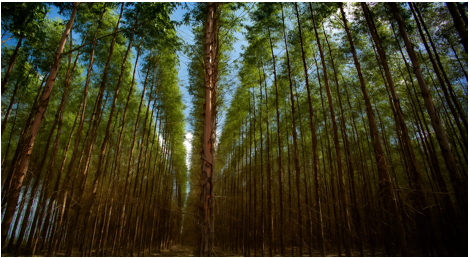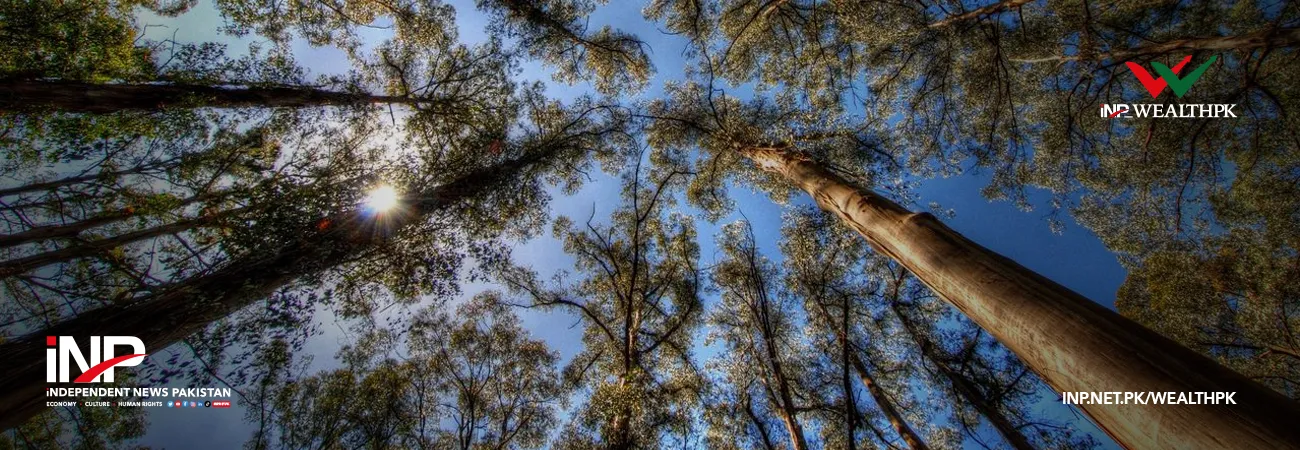INP-WealthPk
Azeem Ahmed Khan
Eucalyptus, a tall and fast-growing evergreen tree, can become a game-changer for Pakistan’s forestry and economy, when planted in areas unsuitable for other tree species, said Dr Anwar Ali, Director of Forestry Research at Pakistan Forest Institute (PFI).

“Eucalyptus has the potential to transform barren and non-productive lands into thriving green forests, helping combat erosion and reduce flood risks,” he said while talking to WealthPK.
With Pakistan’s forest cover currently at just 5%, expanding eucalyptus plantations in treeless and marginal lands could significantly enhance wood supply in the country, he said.
“The tree’s adaptability to dry, saline, rocky, and even waterlogged soils has already turned many barren regions green. It is drought-tolerant, affordable, and easy to cultivate. However, it should not be planted in natural ecosystems to safeguard native flora and fauna,” he said.
Dr Anwar emphasised that eucalyptus can be grown throughout Pakistan in the subtropical zone, particularly in the saline and waterlogged plains of Sindh, Punjab, and Khyber Pakhtunkhwa. However, he recommended planting it below hilly areas for optimal results.
Though there are some claims of negative impacts of eucalyptus on local ecosystems, particularly its high-water usage and impact on soil health, most of such claims are yet to be properly investigated. “The key lies in proper site selection because eucalyptus should not be planted on fertile agricultural lands, as it can harm crops and groundwater. But in saline or degraded areas, there is no better option,” he said.
“There’s a simple rule: eucalyptus is a good tree for bad land, but a bad tree for good land,” Dr Anwar noted. He said the tree’s negative reputation stems from poor planning in earlier plantations, where it was introduced in fertile, water-scarce regions. “Uninformed criticism can hinder Pakistan’s industrial progress,” he warned.
From an environmental perspective, eucalyptus produces more wood and biomass than any other species, a critical advantage for a resource-scarce country like Pakistan, which faces chronic shortages of energy, wood, and forest cover. “If eucalyptus is banned entirely, people may turn to cutting down natural forests to meet their needs,” Dr Anwar cautioned.
On ecological benefits, a technical report of the PFI pointed out that eucalyptus provides abundant nectar and pollen, serving as a rich food source for bees. Honey made from eucalyptus nectar has unique flavours and aromas popular with consumers, it added.
Industrially, eucalyptus plays a vital role in several sectors. Its wood, known for strength and durability, is used in making furniture, boat frames, tobacco-curing racks, door frames, veneers, flooring, and plywood. Though eucalyptus is a hardwood and challenging to process, its resilience makes it ideal for heavy-duty applications, the report mentioned.
Eucalyptus also contributes to the paper industry. Its high pulp content is suitable for producing high-quality paper with a smooth surface, strong grammage, and good resistance to tearing and folding features, the report noted.
As a source of fuelwood, eucalyptus is especially valuable in winter, powering boilers with its high calorific value. It offers a sustainable energy alternative for many regions in Pakistan, the report added.
The report also highlighted its significance in the healthcare sector. Eucalyptus oil, extracted from its leaves, is widely used in pharmaceuticals, cosmetics, insecticides, and therapeutic products. It helps treat ailments like coughs, congestion, bronchitis, sore throats, pneumonia, arthritis, and muscle pain, the report mentioned.
Credit: INP-WealthPk









